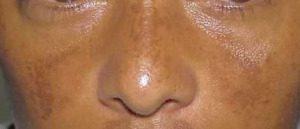
According to the American Academy of Dermatology, up to 70 percent of pregnant women experience the “pregnancy mask” – dark blotches of skin on the face. The medical terminology for this condition is melasma or chloasma.
Darker complexions are more prone to pigmentation issues that lighter skin types, but it may affect anyone experiencing hormonal changes caused by pregnancy. The effects of chloasma may become more pronounced with each pregnancy, severely frustrating, upsetting and undesirable for future moms.
The dark patches will usually appear around your cheekbones, forehead, upper lip, nose, cheekbones, and forehead, sometimes in the shape of a mask. Patches may develop on your cheeks, along your jawline or on your forearms and other parts of your body that are usually exposed to the sun.
Parts of your body that are naturally more pigmented such as your nipples, freckles, scars, and the skin around your genitals often become darker during pregnancy. This also happens in areas that are more prone to friction such as the inner thighs and your underarms.
Many pigment changes are caused by hormonal shifts during pregnancy, which stimulate a temporary increase in melanin production, the natural substance that gives color to hair, skin, and eyes. The areas of increased pigmentation will probably fade within a few months after delivery and your skin should return to its normal shade. However, in some women, the changes do not completely disappear. When this happens, contact our office and schedule a consultation for treatment of pregnancy mask in Orange County.
Can I Do Anything to Prevent Skin Discolorations During Pregnancy?
Skin pigmentation issues usually clear on their own after pregnancy, but there are a few things you can do to safely minimize these issues in the meantime:
- Protect yourself from the sun: Whether it’s sunny or not, use a broad-spectrum sunblock (a formula that protects against both UVA and UVB rays) with SPF 30 or higher every day and reapply often during the course of the day if you are outside. Protecting yourself from the sun is important because the exposure to the sun’s ultraviolet (UV) rays intensifies pigment changes. It is also helpful to add a high quality antioxidant, as well.
- When you’re outside, cover up and wear a hat with a brim (take a look at UV protective hats like those made by Physician Endorsed ), as well as a shirt with long sleeves if you have pigmentation changes on your arms. Limit the time you spend in the sun, especially between 10 a.m. and 2 p.m. And definitely avoid tanning salons.
- Use gentle cleansers and facial creams. Skin care products that irritate the skin may make pigmentation issues and pregnancy mask in Orange County worse. Apply concealing makeup. (Don’t use skin-bleaching products now. Wait to see if pigmentation issues go away after you give birth.)
What to Do If the Pigmentation Does Not Go Away After My Baby is Born?
Provided you are not nursing, you can use hydroquinone, retinoids, and TXA. Thulium and picosecond lasers can help lift pregnancy mask in Orange County. Laser assisted delivery of medications can improve your results. It is important to use a quality antioxidant and sunscreen every day to protect from blue light and ultra visible light.
I’m Not Pregnant But I Still Have What Looks Like Pregnancy Mask…Why is This?
You’re not alone. Hormones in birth control pills cause many women to contend with melasma. Your doctor may change your prescription if this is a problem. A dermatologist can tell you which birth control pills are least likely to cause hyperpigmentation, but the final choice is between you and your primary physician.
Schedule Your Consultation Visit in Orange County for Treatment of Pregnancy Mask

You’ll enjoy a relaxing visit to our office where you can ask questions, meet our staff, take a tour of our office and surgical suite and view additional photo results of our patients.
Your consultation assessment is with Dr. Sikorski, not an impersonal or commissioned sales person. Fees and procedure preparations are discussed with our patient coordinator, who will detail the surgical experience with you.
We look forward to meeting with you and helping you find the simplest solution to achieve the goals you desire. Get more information on pregnancy mask in Laguna Niguel by scheduling a consultation with Dr. Sikorski at her office. Contact us by phone or use our online form.
 contact us today
contact us today
